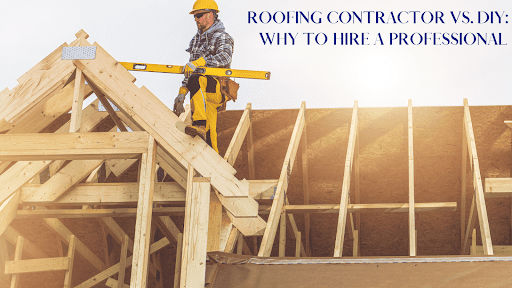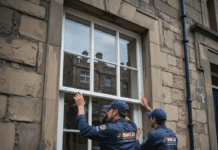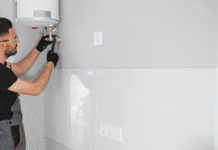Last Updated on March 17, 2024 by Umer Malik
Your roof is one of the most important components of your home. It protects you and your family from the elements while enhancing curb appeal. When it’s time for roofing repairs or replacement, you have two options. You can hire a professional roofing contractor or attempt a do-it-yourself (DIY) project. Choosing the right option is crucial for ensuring safety, quality, and long-term cost-effectiveness.
Table of Contents
Advantages of Hiring a Professional Roofing Contractor
Professional roofing contractors have extensive expertise and experience that the average homeowner lacks. They have the skills and materials to assess, diagnose, and solve any type of roofing issue.
Knowledge and Experience
Seasoned roofers have an eye for spotting and repairing underlying problems before they worsen. For example, they can immediately tell if water ponding is due to improper design or installation issues. They know the precise repair needed for that particular roofing system.
Their extensive technical skills also enable them to handle installations, repairs, and replacements. A reliable crew works in quick coordination to cover all areas. Plus, experienced contractors are versed in local building codes and compliance requirements.
Advanced Equipment and Materials
Another advantage of professionals is their access to high-grade materials at wholesale rates. Thanks to extensive vendor networks, relationships, and buying power. They can source excellent roofing products for clients at competitive prices.
Hiring the best Portland roofer, for instance, ensures a level of skill, experience, and industry knowledge that DIY endeavors may lack.
They also have advanced tools like tile cutters, seam welders, and commercial sprayers required for certain installations. A homeowner rarely purchases these for DIY use due to infrequent need and high costs.
Warranties and Insurance
The material and workmanship warranties reputable companies provide, ranging from 10 to 25 years as per the Roofing Industry Alliance for Progress, offer long-lasting peace of mind. DIY repairs don’t usually come with guarantees against premature leaks or damage.
Certified contractors also carry robust liability insurance and worker’s compensation coverage to handle on-site accidents without leaving clients vulnerable.
When is DIY Roofing Acceptable?
DIY roofing isn’t advisable for major repairs or full replacements. But, it can work for minor maintenance if done.
Suitable DIY Roofing Tasks
- Replacing a few damaged shingles
- Clearing gutters and downspouts
- Applying protective sealants
- Checking for leaks after severe weather
For small jobs like these, DIY may suffice if you:
- Research correct methods
- Get the necessary skills and equipment
- Follow OSHA safety rules, like wearing harnesses and setting up barricades
Without due diligence, even minor DIY projects can spiral out of control. Consulting a professional first is wise.
In some cases, DIY roofing can work, but choosing a reputable company is key. So how do you select the right contractor?
Choosing the Right Roofing Contractor
Given the presence of elaborate scams and unethical operators, homeowners must thoroughly vet roofing contractors before making a hiring decision.
Gather Candidate List
Start by gathering a list of licensed roofing contractors in your area through online directories or word-of-mouth referrals.
Cast a wide initial net by looking for insulation installers, gutter repair services, and siding specialists as well. Those offering comprehensive exterior remodeling tend to be more established.
Check Credentials
Verify each prospect’s licensing, insurance policies, bond compliance, and legal standing through public databases. Search for dissolved businesses, suspensions, penalties, and infractions.
Scan the Better Business Bureau and online reviews to check ratings, complaints, resolution patterns, strengths, and weaknesses.
Interview Contractors
Schedule in-person consultations with your top 3-5 prospects to check professionalism, explanation of processes, proposed solutions, expected timelines, and cost estimates.
Ask specific questions about their experience with homes like yours, subcontracting practices, safety protocols, percentage of work done in-house, and post-project support.
Checking references from recent clients who had similar projects ensures a transparent insight into the actual work carried out.
Meeting in-person also helps assess the company’s general responsiveness, attentiveness to your concerns, willingness to explain, and rapport.
Analyzing these collective factors helps reveal the most reliable, skilled, communicative, safety-focused, and ethical roofing partner ready to deliver exceptional service. Leverage your contractor relationships.
Helpful Tips
- Interview at least three contractors in person
- Compare many quotes to find fair market pricing
- Verify liability insurance and workers’ comp coverage
Considering the abundance of choices, selecting the right contractor requires diligence and thorough research.
The Risks of DIY Roofing
DIY roofing may seem like an easy way to save money. This approach often leads to mistakes, injuries, and effects on results.
Lack of expertise: The National Roofing Contractors Association (NRCA) warns that improper DIY roofing can reduce a roof’s expected lifespan by 25%. Without proper skills and knowledge, DIYers often make unnoticed errors.
Safety hazards: The Occupational Safety and Health Administration (OSHA) reports that falls are the leading cause of construction worker fatalities, with roofing being risky. DIYers rarely take adequate precautions.
Quality and durability issues: A study in the Journal of Performance of Constructed Facilities found that professionals are 10 times less likely to make installation errors than DIY attempts. DIY roofs are more prone to failure.
FAQs
How much does it cost to hire a roofing contractor?
Costs vary based on the roof’s size, pitch, materials, accessibility, repairs needed, your location, and more. That’s why getting quotes from many licensed professionals is crucial for accurate pricing.
What are signs I need a roofing contractor?
Indications you may need professional help include visible leaks, excessive moisture inside the home, damaged, curling, or missing shingles, dark streaks on the roof, sagging roof decking, and granule buildup in gutters. Conduct semi-annual inspections to spot issues early.
Can I DIY a roof replacement to save money?
Roof replacements are complex, risky, and disruptive. While DIY may appear more cost-effective initially, attempting it without the necessary experience, equipment, supplies, and labor can lead to higher repair costs in the long run. In many cases, the long-term savings of hiring a professional outweigh the initial expenses.
Conclusion
Your roof is one of your most valuable assets, so make sure it gets the care it deserves. Attempting extensive DIY roofing often leads to health hazards, damage liability, unsatisfactory results, and unnecessary future costs. Investing in a professional roofing contractor is the most effective way to safeguard your home and ensure peace of mind for years to come.
















